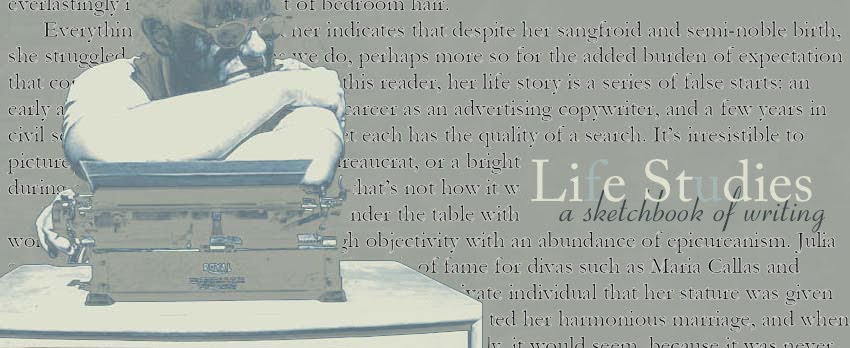The face was a young man of about 25 but the voice was a woman's, elegant and high and accented—Ingrid Bergman in Gaslight.
It took me many glances to understand this.
His dark hair was a 50s buzz cut and his blue short-sleeve shirt seemed hard-pressed to make it all the way down his ectomorph's flank. Two grandmothers sat with him, one on his side and the other across the table.
Whunn you haff a high IQ you either find a suit-a-ble ac-tiv-i-ty or turn to alcohol and drugs. This is how it tis.
Because I have fallen in love with lesbians—unbeknownst—I had to keep glancing, over my left shoulder and uncomfortably backward. Yes, yes, it was a boy, despite that voice.
My ravioli arrived.
The old ladies mixed their Castillian with their English in the chic manner I had only heard—when I was 25—in Buenos Aires. I could not tell whether the boy was Andalusian or Swedish (or Czech). I only knew he was long-waisted and bony and he spoke like an actress in a Turner Classic Movie.
You either meet good people and be-gin to do good things or you meet bahd people and do bahd things. There is no in be-tween. You must be-lieve this.
A single block from the office, once again coming to the always empty restaurant placed me into a completely different world. Sometimes the other diners were in real estate, or investing, and one lunchtime I sat listening to a table of two sisters and their brother—all in their late 60s—arguing whose life had been more financially ruinous and more deserving of the vast inheritance apparently in the balance.
These conversations always trumped my Kindle, and, again, I laid my glasses down beside the cheap cutlery and expensive napkin.
One of the grannies pays the bill, and the boy is not troubled by responsibility, is not aware of the bill or, perhaps, even the food. He is calm and desperate at the same time. He is a character from Tennessee Williams.
His hair is too short and his shirt is too drab but his face is cinematic like Montgomery Clift's. Nothing he says in the short time I am near him builds upon anything else. It is not linear, and the old ladies—one at each side—hold him, psychically, like a balloon.
The big empty room full of tables is dark, and the only light comes from one long window that faces the quiet street.
I wonder what it is like to wake up next to him: what it is like to observe someone in a brief physiological moment—as I observed Bob, 30 years ago, his hair tousled and his perfect features crimped by sleep—who lives always within the cerebral, or the artistic, or just the neurotic.
The reverse of this would be watching a boxer play an oboe.
One of the grandmothers says I never thought Robin Williams was funny, and the other echoes her ... no, not funny. I wait with particular attention for the young man's response to this, but I cannot hear it.
I pay my bill and leave.
There is no in-between.
